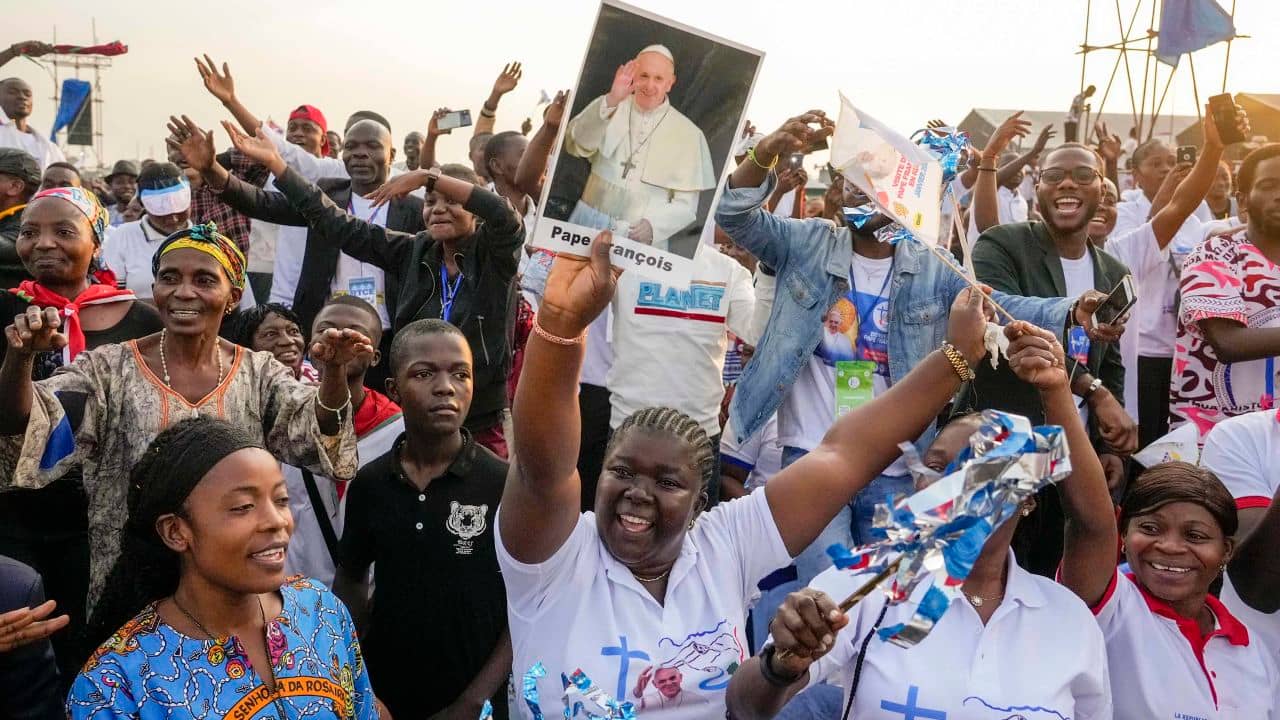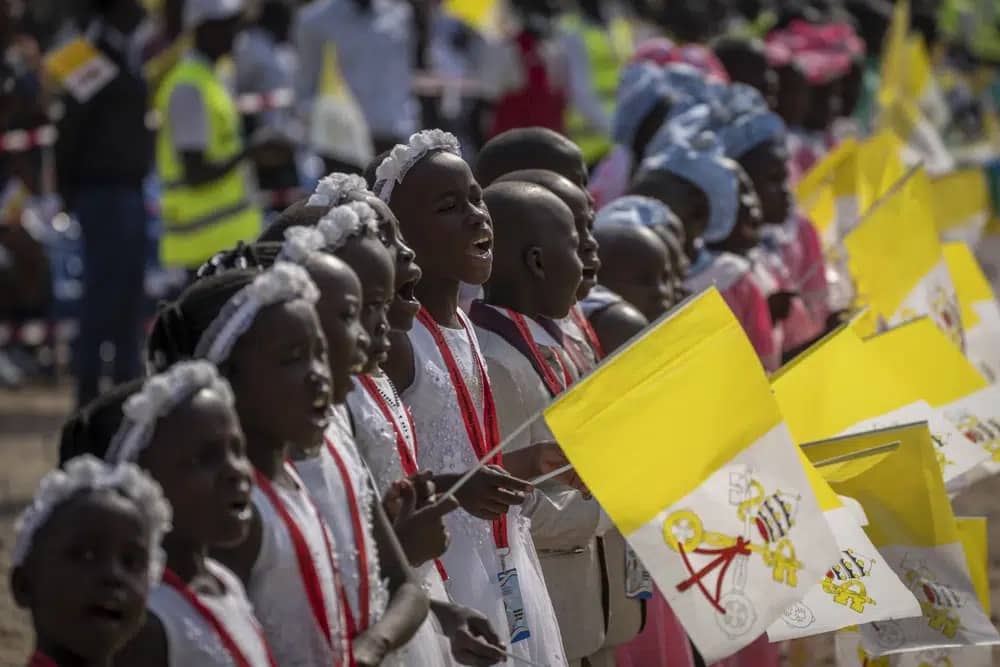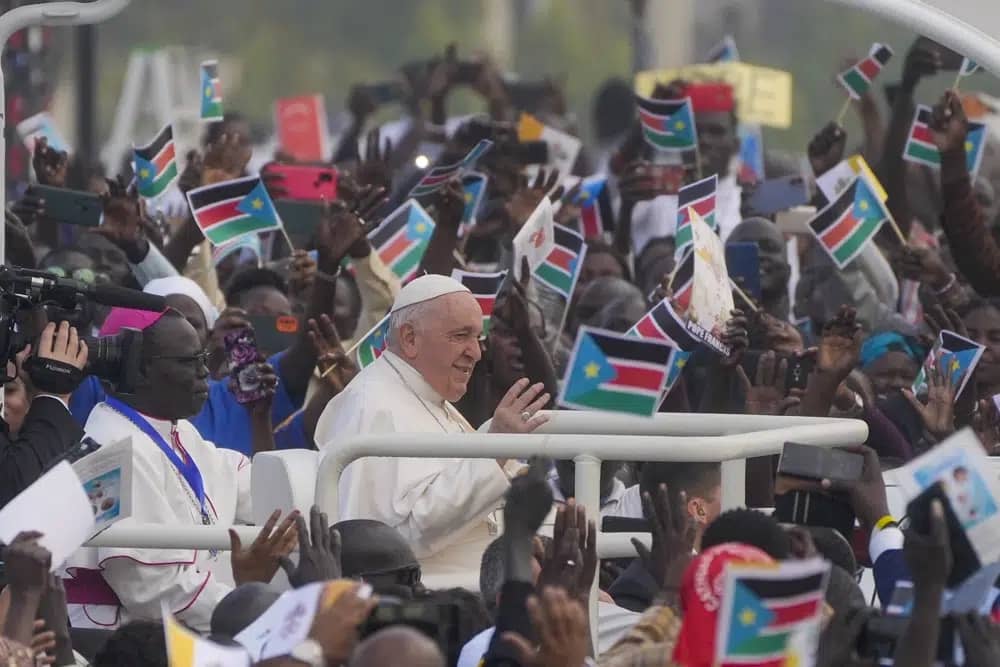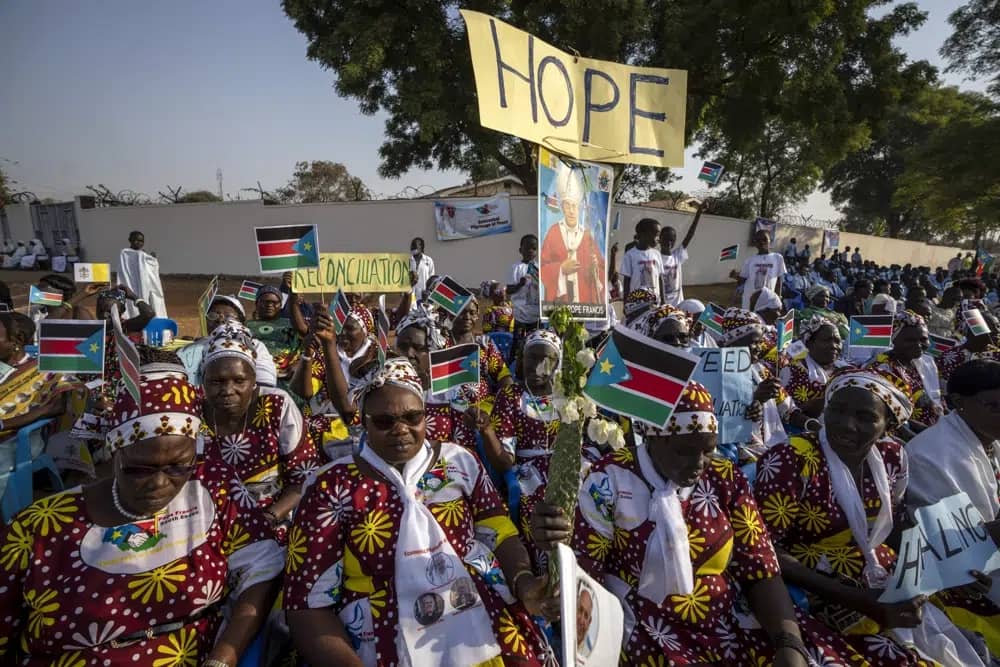ROME – Victims of the bloody conflict scarring eastern Congo met Pope Francis Wednesday, sharing their stories of horror and crediting the Catholic Church for making their recovery possible.
Pope Francis is on a 6-day visit to the Democratic Republic of Congo and South Sudan. He is currently in Kinshasa, the capital city of the DRC, which, for over three decades, has been marred by a bloody war mostly concentrated in the country’s east that’s left millions of people dead and displaced.
As the Congolese army battles around 120 rebel groups, the most prominent of which is known as “M23,” violent attacks, sexual assaults and rape, and mutilation have become almost commonplace for many villages in the country’s eastern regions.
On his second day in Congo, Francis met with a group of victims of the war, sharing their stories of tragedy, horror, and recovery.
In her story, Bijoux Mukumbi Kamala, from Goma, recounted how in 2020, when she was just 17, a “Calvary of suffering” began one day when she and some other women went to get water from a nearby river and came across a rebel group.
The rebels, she said, took the women into the forest, with each rebel choosing the woman they wanted.
Kamala said she was taken by the commander of the group, who “raped me like an animal” and kept her as a prisoner, raping her several times a day, at times for several hours.
“It was excruciating,” she said, saying, “It was useless to scream, because no one could hear me or come to my rescue.”
She spent 19 months in captivity before finally escaping with two other women. By the time Kamala escaped, she was pregnant with twin girls, who were with her at their meeting with the pope.
Amid the increased killing sprees, displacement, sexual violence and uncertainty, with countless people experiencing stories similar to hers, Kamala said the church “remains the only refuge that heals our wounds and consoles our hearts.”
She said she was able to heal with the help of local parishes services and those offered by the international charity, Caritas, and told the pope that his presence “reassures us that the whole Church takes care of us.”
Similarly, Ladislas Kambale Kombi, from Butembo-Beni, who is 17, said he was a farmer by trade, and that several years ago his older brother was killed under circumstances that are “still unknown,” and that his father was slaughtered in front of him by rebels in military attire who entered his home.
“From my hiding place, I followed how they chopped him up in pieces. Then his severed head was put into a basket,” he said, saying the rebels who attacked his home then took his mother and raped her, and that they had not seen her since and still don’t know “what they did to her.”
“We were orphans, me and my two little sisters,” he said, saying the horror of what happened continues to haunt him and he still struggles to sleep at night.
“It’s difficult to understand such wickedness, this almost animal-like brutality,” he said, saying the psychological and spiritual help offered by the Catholic Church to him and other children who experienced similar trauma has allowed him to forgive the “torturers” who killed his family.
Recounting how he himself was held captive for nine months, Kombi prayed that God would “touch the hearts of the torturers so that they free the other children” who are still in captivity.
Father Guy-Robert Mandro Deholo, whose left hand was mutilated by rebels some time ago and is missing several fingers, read aloud the story of a woman named Desire Dhetsina, who prepared her testimony some time ago in anticipation of the pope’s trip, but who disappeared some months ago and has not been heard from since.
As he spoke, two women present who also had one of their hands and wrists cut off, raised their arms into the air. Pope Francis later greeted the women and held their scarred limbs in his hands.
From the eastern town of Bunia, Dhetsina in her written testimony said she survived an attack on a camp of displaced people that happened exactly one year ago, the night of Feb. 1, 2022, and left a total of 63 people, including 24 women and 17 children, dead.
“I saw the savagery: people cut up like butcher meat, women disemboweled, men decapitated,” she said, saying that the internally displaced linger in camps with no hope of returning home because of the death, destruction, looting, and threat of sexual violence.
“We need peace and nothing other than peace…we want to return to our homes, educate our children, live together with our old neighbors, far from the sound of war,” she said, and prayed that God would “give us moments of peace and tranquility where everyone has good feelings for one another.”
Another woman named Emelda M’karhungulu from the eastern town of Bugobe, in her testimony said her village was attacked in 2005, with rebels taking as many hostages as they could, forcing others to flee, and looting the homes of locals.
M’karhungulu, who was just 16 at the time, said the group killed many of the men, whereas the women were taken, and she herself was kept as a “sexual slave” for three months. During her captivity, she said that every day, anywhere from 5-10 men would rape each of the women being held.
In addition to the trauma of her assaults, M’karhungulu said the prisoners were also forced to eat corn pasta and meat prepared from the bodies of men their captors had killed. At times, she said, they mixed in the severed heads of the people they slaughtered with animal meat.
“This was our daily food,” she said, saying the prisoners were made to live naked so that they would be too ashamed to escape. However, she finally fled one day when she went to the river to gather water, and when she returned home, was taken to the hospital by her parents for necessary care.
M’karhungulu said the Catholic Church was essential to her recovery and thanked them, saying that thanks to the church’s proximity, “I could assume and accept my situation,” and today lives “as an accomplished woman who accepts her past.”
She also lamented the natural disasters that have compounded the violence plaguing the country, including intense flooding last year, and thanked Pope Francis for his visit.
“You are leaving us a legacy, a gift of love through closeness, through your closeness,” she said, saying the people of Congo “want a different future.”
“We want to leave this dark past behind and be able to build a beautiful future. We ask for justice and peace,” she said, and urged fellow victims to “forgive our executioners for all they have done and ask the Lord for the grace of a peaceful, human and fraternal coexistence.”
Follow Elise Ann Allen on Twitter: @eliseannallen















